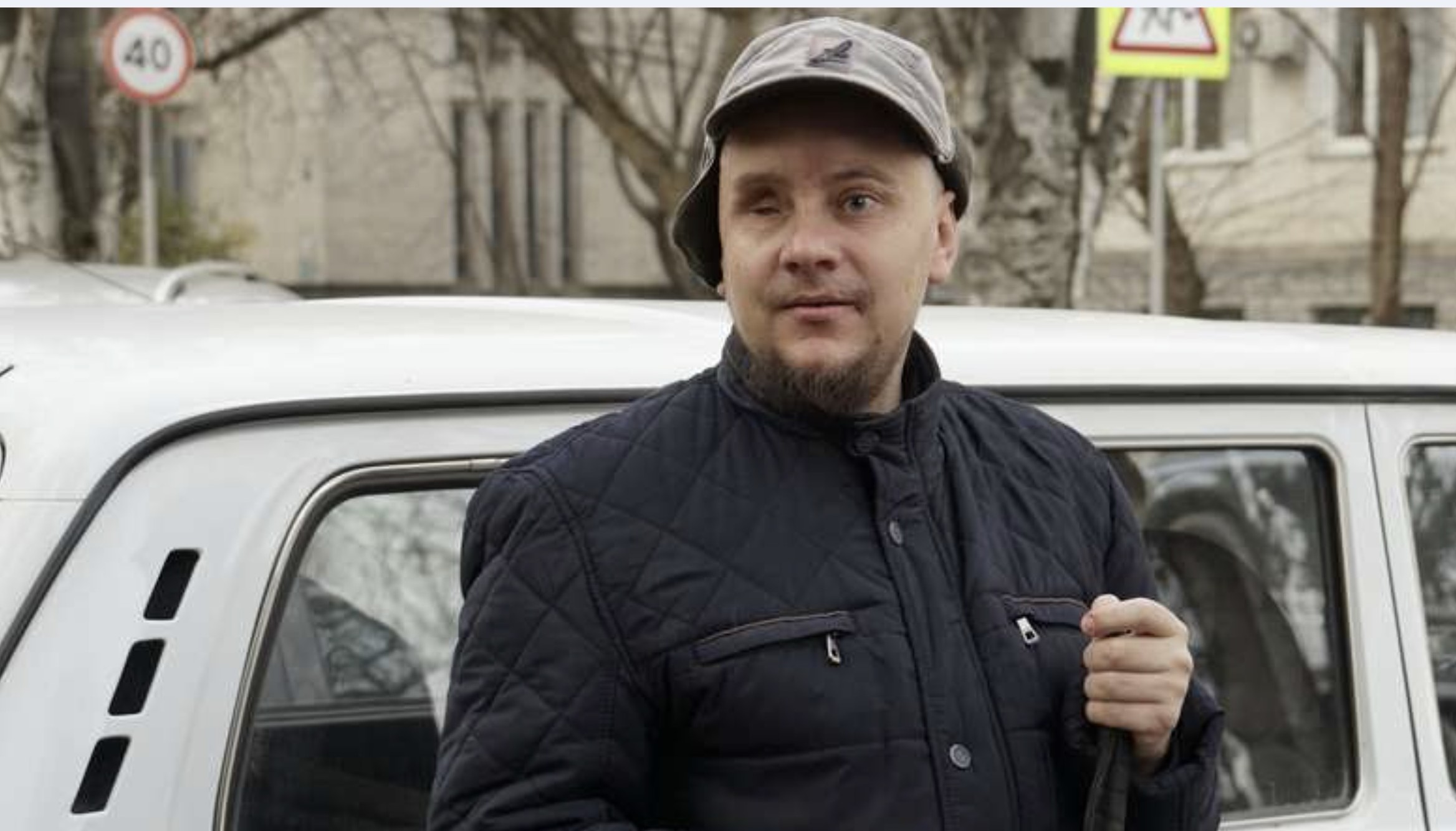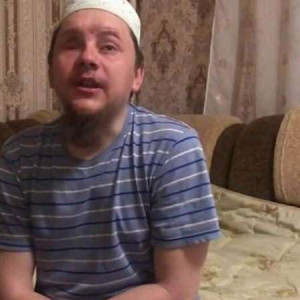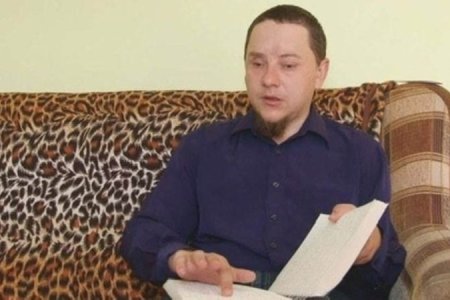
Russia’s Krasnoyarsk regional court on 21 October 2025 issued a ruling, ordering that Oleksandr Sizikov, who is blind and cannot walk about without help, be returned to a Russian prison to serve the remainder of an internationally condemned 17-year sentence. It thus allowed the Russian prosecutor’s appeal against an earlier fully justified ruling which had ordered that Sizikov be released.
According to lawyer Nazim Shekhmambetov, it is unclear what arguments for returning Sizikov to prison were presented by the state prosecutor. There can be no legal arguments, as Sizikov’s release was in full accordance even with Russian legislation, however it cannot be said that this turnaround is entirely unexpected. It comes exactly a week after a similarly lawless ruling was passed, ordering the rearrest of 57-year-old Lenur Khalilov, the only other Crimean political prisoner released by Russian courts due to health reasons. In Khalilov’s case, the ruling, ordering his release because he is suffering from cancer, was issued by the Isakogorsk district court in Arkhangelsk on 20 August 2025. It was, however, challenged by prosecutor N. Ryazanov, and overturned on 14 October by the Arkhangelsk regional court. As well as brazen lies, such as the assertion that Khalilov could be adequately treated in the Russian prison colony, Ryazanov also claimed that it would be “unjust to society” to release him as he was, purportedly, “a particularly dangerous criminal” and “a terrorist”. Since the politically motivated and deeply flawed charges against both Khalilov and Sizikov are essentially identical, it seems likely that this was also the ‘justification’ given for once again imprisoning a blind man who needs help moving about. Both men are recognized political prisoners whose release has been demanded in resolutions from the UN General Assembly, OSCE and other international bodies.
Both men have conditions that Russia’s own legislation acknowledges should preclude imprisonment. In Sizikov’s case, this was clear before his arrest, yet it did not stop the FSB from targeting him, nor two Russian courts from sentencing him to seventeen years in the harshest of Russia’s penal institutions. He was, however, held under house arrest, rather than detention, until after the appeal against the sentence was rejected, The application for Sizikov to be freed came from Russia’s prison service four months after Sizikov was brought to the harsh-regime Minusinsk Prison in Siberia where he was due to serve the first years of a 17-year sentence. According to Olena Sizikova, her son had recently been taken to the Krasnoyarsk tuberculosis hospital No. 1 and given a medical examination. This had confirmed what, in fact, was clear from Sizikov’s medical records, namely that Oleksandr is totally blind, and is also suffering from third stage (or severe) hypertension. In their report, the doctors recommended that Sizikov be released as his main condition, total blindness, is on the list of conditions precluding imprisonment. In April 2025, the Russian prison service filed an application for Sizikov to be released from serving his sentence due to his state of health (Article 81 of Russia’s criminal code and Article 396.6 of the criminal procedure code). This was allowed on 26 May 2025 by the Minusinsk district court.
The prison service bought Sizikov train tickets from Krasnoyarsk to Sochi, from where his mother was able to meet him and return him to Crimea.
It was the prison service and Minusinsk district court’s compliance with Russian legislation that the state prosecutor (and those above, responsible for political decisions) challenged. The Krasnoyarsk regional court clearly understood what was demanded of it and ruled that a blind and disabled man should serve all of a 17-year sentence in the appalling conditions of a Russian prison colony thousands of kilometres from his family and home.
By 2020, Russia’s conveyor-belt ‘trials’ on fabricated terrorism charges had been recognized internationally as a weapon, in particular, against journalists and activists from the vital Crimean Solidarity human rights movement. Although there were other cases where men with grave health issues were illegally imprisoned, Russia seemed to have hit a new on 7 July 2020 with its arrest of blind and disabled Oleksandr Sizikov (and six other Crimean Muslims). All of the arrests and ‘terrorism’ charges were based solely on unproven allegations of ‘involvement’ in Hizb ut-Tahrir, a peaceful, if controversial, transnational Muslim organization which is legal in Ukraine. Russia is using a secretive and unexplained supreme court ruling from 2003 which declared Hizb ut-Tahrir ‘terrorist’ as excuse for sentencing Crimean Tatar and other Ukrainian Muslims to up to 20 years’ imprisonment.

Oleksandr Sizikov (b. 1984) was arrested with two Crimean Tatars Seiran Khairedinov (b. 1986) and Alim Sufianov (b. 1980). Despite his disability, Sizikov had held several single-person pickets, protesting against the mounting repression in occupied Crimea, especially that against Crimean Muslims. Khairedinov and Sufianov had also actively supported political prisoners and their families. The two younger men have been imprisoned since 7 July 2020. Sufianov, who was 30 when arrested, had only recently married. Khairedinov, who is four years older, has three children: Emil; Elvina and Yasmina, who was only a year old when her father was arrested.
This case, even by Russian standards, seemed breathtakingly lawless, as the FSB designated Sizikov as ‘organizer’ of a supposed ‘Hizb ut-Tahrir group’, under Article 205.5 § 1 of Russia’s criminal code) with this carrying an effectively guaranteed sentence of 17-20 years’ maximum-security imprisonment. Khairedinov and Sufianov were accused of the less serious ‘involvement’ in the alleged group, under Article 205.5 § 2. In occupied Crimea, Russia now standardly also brings a further preposterous charge, under Article 278, of ‘planning to violently seize power’. In one trial, the prosecution tried to justify this truly surreal charge by claiming that the men had been planning a state coup via ‘“the total Islamization of the population”.
Although the charges are under Russia’s ‘terrorism legislation’, the FSB never make any pretence of looking for anything but ‘prohibited religious literature’ during their armed searches. On most occasions, they bring such literature which they then claim to have found in places where no devout Muslim would keep religious books. It was clear on the day of these alleged ‘searches’ that such material had been planted in Khairedinov and Sufianov’s homes. It was only later, during the ‘trial’, that it became clear that the FSB had also planted books in Sizikov’s home – books that were not in Braille and which he could not possibly have read since the catastrophic bike accident that left him blind in 2009.
The other ‘evidence’ in the case was just as flawed, with the same ‘secret witnesses’ used here as in numerous other political trials of men from Bakhchysarai. Neither Sizikov’s disabilities, nor the lack of any justification for such charges against men who were not accused of any identifiable crime, made any difference to two Russian courts. On 17 May 2023, ‘judges’ Kirill Krivtsov (presiding), together with Alexei Magomadov and Sergei Yarosh from the Southern District Military Court in Rostov found all three men ‘guilty’ both of the charges under Article 205.5 and of the charge of ‘planning to violently seize power’. Sizikov was sentenced to 17 years, Khairedinov and Sufianov to 12 years’, with subsequent periods of 18 months and 12 months, respectively, of restricted liberty. The sentences were for maximum-security penal institutions, with the first four years in the harshest of these, a prison.
All of these sentences against innocent men were upheld by the Vlasikha military court of appeal on 13 September 2024.



